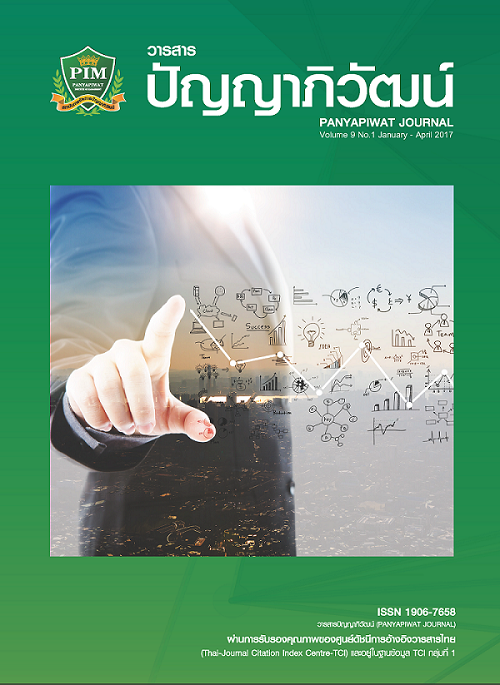แรงบันดาลใจในการมีจิตสาธารณะเพื่อการท่องเที่ยวอย่างยั่งยืน
Main Article Content
บทคัดย่อ
แรงบันดาลใจสามารถขับเคลื่อนการคิด และกระตุ้นการปฏิบัติให้เกิดพฤติกรรมเพื่ออนุรักษ์สิ่งแวดล้อม โดยเฉพาะพฤติกรรมการอนุรักษ์สิ่งแวดล้อมขณะท่องเที่ยวมีส่วนสำคัญในการรักษาสิ่งแวดล้อมในแหล่งท่องเที่ยวนั้นๆ การมุ่งเน้นเพื่อสร้างแรงบันดาลใจในการมีจิตสาธารณะเพื่อการอนุรักษ์สิ่งแวดล้อมขณะท่องเที่ยวจึงนับเป็นปัจจัยสำคัญที่จะช่วยขับเคลื่อนให้บุคคลมีจิตสำนึก ความตระหนัก เจตคติที่ดี และพฤติกรรมที่เป็นมิตรต่อสิ่งแวดล้อม ในการจัดการท่องเที่ยวนั้น ทุกภาคส่วนควรส่งเสริมกิจกรรมการท่องเที่ยวที่บูรณาการกับกิจกรรมที่สร้างจิตสาธารณะเพื่อการอนุรักษ์สิ่งแวดล้อมและทรัพยากรทางการท่องเที่ยว อีกทั้ง คำนึงถึงการคงอยู่ของอัตลักษณ์ ดั้งเดิมของชุมชนและท้องถิ่น มากกว่าการมุ่งเน้นที่ผลประโยชน์ด้านรายได้ อันจะนำไปสู่การท่องเที่ยวอย่างยั่งยืน
Inspiration can be a driven approach of thought and stimulate behavior to protect the environment. Especially, environmental friendly behavior while travelling plays an important role in preserving travel destinations. Focusing on building of inspiration in public mind for environmental conservation while travelling has become a major factor that can enhance human’s public consciousness, good awareness and attitude towards the environment. All sectors should promote tourism activities with the integration of public consciousness activities for the environment and tourism resources conservation and focus on the retention of the persistent identity of local communities, rather than the advantage of income. These will lead to the sustainable tourism.
Article Details
“ข้าพเจ้าและผู้เขียนร่วม (ถ้ามี) ขอรับรองว่า บทความที่เสนอมานี้ยังไม่เคยได้รับการตีพิมพ์และไม่ได้อยู่ระหว่างกระบวนการพิจารณาลงตีพิมพ์ในวารสารหรือแหล่งเผยแพร่อื่นใด ข้าพเจ้าและผู้เขียนร่วมยอมรับหลักเกณฑ์การพิจารณาต้นฉบับ ทั้งยินยอมให้กองบรรณาธิการมีสิทธิ์พิจารณาและตรวจแก้ต้นฉบับได้ตามที่เห็นสมควร พร้อมนี้ขอมอบลิขสิทธิ์บทความที่ได้รับการตีพิมพ์ให้แก่สถาบันการจัดการปัญญาภิวัฒน์หากมีการฟ้องร้องเรื่องการละเมิดลิขสิทธิ์เกี่ยวกับภาพ กราฟ ข้อความส่วนใดส่วนหนึ่งและ/หรือข้อคิดเห็นที่ปรากฏในบทความข้าพเจ้าและผู้เขียนร่วมยินยอมรับผิดชอบแต่เพียงฝ่ายเดียว”
เอกสารอ้างอิง
Anacamee, S. S. (2009). Creativeness Power of an Inspiration. Bangkok: Siamese Publishing House. [in Thai]
Chittangwattana, B. & Srikhampha, P. (2014). Sustainable Tourism Development (2nd ed.). Nonthaburi: Thammasan. [in Thai]
Kosol, O. & Suttawet, C. (2014). Sustainable Tourism Management for Supporting ASEAN Economics Community. Journal of Politics and Governance, 4(1), 200-232. [in Thai]
Maksuriwong, P. (2010). Inspiration. Retrieved August 10, 2015, from http://pattamarot.blogspot.com/2010/11/inspiration.html [in Thai]
Office of the National Economics and Social Development Board. (2011). The National Economic and Social Development Plan No. 11 (2012-2016). Retrieved March 25, 2016, from http://www.nesdb.go.th/Portals/0/news/plan/p11/plan11.pdf [in Thai]
Pongsakornrungsilp, P. (2014). The Management of Sustainable Community-Based Tourism: The Case of Ban Kokekrai, Phang Nga Province. Veridian E-Journal, 7(3), 650-665. [in Thai]
Praneetham, C. & Leekancha, I. (2015). Inspiration and Consumption Behavior of Consumers for Enhanced Food Security Management. Mediterranean Journal of Social Sciences, 6(6), 453-459.
Pratthajariya, K. (2009). The Design of English Materials to Communicate the Identity of Bang Poo Seaside Resort for Sustainable Tourism. Humanities and Social Sciences, Suansunandha Rajabhat University. [in Thai]
Putjorn, T., Veranavin, L., Kheovichai, K. & Unaromlert, T. (2013). Participatory Action Research in Community-based Tourism Management for Sustainable Community Development at Salakkhok, Trat Province. Journal of Liberal Arts, Prince of Songkla University, 5(2), 102-117. [in Thai]
Saarinen, J. (2014). Critical Sustainability: Setting the Limits to Growth and Responsibility in Tourism. Sustainability, 6, 1-17.
Samutachak, B. (2009). Inspiration: Power of Breath. Retrieved August 15, 2015, from http://www.dpu.ac.th/laic/upload/content/file/article_instrctor/ta57/14_79_2552.pdf [in Thai]
Sinthipong, U. (2015). Local Community and the Participation in the Management of Natural Resources for Sustainable Use. Executive Journal, 35(1), 104-113. [in Thai]
Sommit, K., Boonpaisarnsatit, N. & Saetiao, S. (2014). Volunteer Tourism and Opportunities for Social Enterprises in the Upper Northern Thailand. Panyapiwat Journal, 6(1), 33-44. [in Thai]
Suwanthunma, K., Pinpradit, N. & Kuroda, A. (2014). The Development of Public Mind Instructional Model Based on the Contemplative Education and Social Cognitive Theory for Elementary Students. Journal of Education Graduate Studies Research, 8(1), 37-45. [in Thai]
Thiengkamol, N. (2011). Development of Model of Environmental Education and Inspiration of Public Consciousness Influencing to Global Warming Alleviation. European Journal of Social Sciences, 25(4), 506-514.
Thiengkamol, N. (2011). Environment and Development Book 1. Bangkok: Chulalongkorn University Press. [in Thai]
Thongsamak, J., Jitpakdee, R. & Aujirapongpan, S. (2013). Creative Tourism: Trends of Sustainable Tourism Development. Journal of Thai Hospitality and Tourism, 8(2), 91-104. [in Thai]
Tumpracha, K. (2013). Development of A Food Security Management Model through an Environmental Education. Doctor of Philosophy Program of Environmental Education, Mahasarakham University. [in Thai]
Vongmonta, A. (2012). Factors Affecting Public - Mindedness of Prince of Songkla University Students. Journal of Education, Prince of Songkla University, Pattani Campus, 23(1), 60-79. [in Thai]


